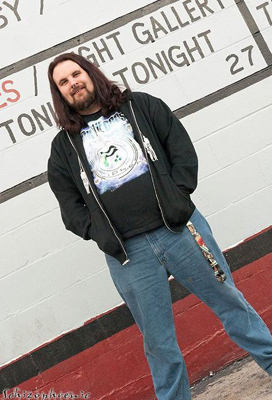
PAO Productions: Thanks for agreeing to this interview.
Torch Idell: Not a problem.
PAO: Tell me about Torch Productions. I would say you're one of the more well-known booking people in the local scene. What kind of services do you provide?
TI: Well with Torch Entertainment we've been doing this for about . . . almost six years at this point, about five and a half now. We offer a wide variety of services - booking, promotion, management, flyer design, general knowledge questions, just a little bit of everything. If I can't put you in one of my shows I can help point you in the direction of somebody that has a show that you can probably get on. It honestly just depends on the band and what they want.
PAO: How far back does your association with the scene go?
TI: Six, seven, eight years, something like that.
PAO: What were you doing before this?
TI: Before I started Torch Entertainment I worked with Robert Miguel with Scream For Me Dallas Productions, and before that I was working with a company called The Street Syndicate out of New Jersey, doing paid street team work for national bands. I worked campaigns with 30 Seconds to Mars when they were in town, I worked for Daniel Tosh, Murder by Death Promotions . . . a little bit of everything from everybody.
PAO: What made you decide to go it alone?
TI: I thought there was money involved with it (smiles). More than what I was making elsewhere, so, you know.
PAO: You live and you learn, right?
TI: Well there is if you know what you're doin', but it takes a lot of time to get to that point.
PAO: How did you get your start booking shows?
TI: I started off helping Robert Miguel with his, and I just kinda took off from there. Figured I could do it better myself. Again, you live and you learn. It's a pain in the ass to do it.
PAO: What's the origin of the name Torch?
TI: That dates back to . . . I think 2005? I was working for Jason's Deli as a delivery driver and I stopped to get a lighter so I could smoke my cigarettes on the way to and from deliveries. [ I ] went to one of Robert's shows, he asked me for a lighter, [ I ] handed it to him, and it damn near burnt his face off. And then from then on I've been referred to as Torch.
PAO: Did you move down here from New Jersey?
TI: No. I've been here all my life, unfortunately.
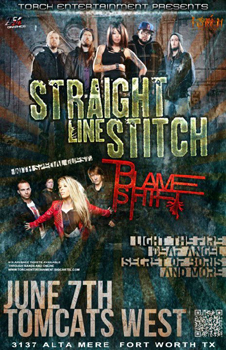
TI: I just had Straight Line Stitch and Blameshift come through town. They were here on June 7th at Tomcats.
PAO: How would you characterize the mission of Torch Entertainment?
TI: To provide bands a chance to get their name out there. A lot of the bands I work with are semi-established already, and it's more or less just, you know, promotional services for them, but I'm here for everybody. Like I want to work with anybody and everybody that's willing to have me work for them. I don't come cheap, but I'm very reasonable about what I have to offer, so . . . it's more or less, you know, to provide my services to those who are willing to accept what I have to offer.
PAO: What are some of the venues you've booked for?
TI: I've booked for Reno's Chop Shop. I've booked for Curtain Club, the Liquid Lounge, and Tomcats. I put shows at the Bone when it was still open. I put a show over at the Door in Dallas a couple years ago. I've worked with . . . um, Elm Street Bar when it was originally . . .
PAO: Darkside Lounge?
TI: Yeah, Darkside Lounge, excuse me. Back when it was actually Darkside Lounge and not one of the many names it's been since.
PAO: Most of the time when I see your shows they seem to be at Reno's. Do you have some association with the management there?
TI: No, it's just a cheap venue to use.
PAO: How many acts do you typically book for a show, and how often do you try to put on a show?
TI: On average I book about five bands a night - sometimes it works out for more, sometimes it works out for less - and I try to do three, four a month, honestly. If I can have something every other week, I'm set. If I can, you know . . . some months it's only two, some months it's five, it really just depends on what I can get going and where.
PAO: How much advance notice do you usually need for a band, if they're trying to get on the bill?
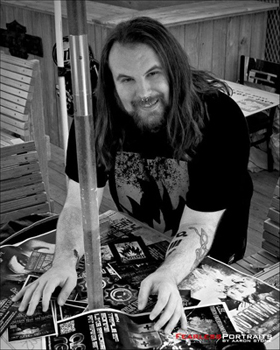
PAO: Do you try to group similar kinds of acts into a theme night?
TI: No, I honestly hate theme nights. This'll be a very generic, you know, this is a "metal show," and this is a "rock show," but other than that I hate doing themes.
PAO: What drives your choice of bands when it comes to booking?
TI: A lot of it's who I work with, that actually can produce numbers. And the night . . . I mean I'll get an offer from a band that says, "Hey we wanna be in town this night, can we get a show?" And as long as I can do it, I'll try to put bands that are similar in nature to whatever band that's coming through town. And sometimes I just grab a show and put it together myself, just because.
PAO: Not a theme, though.
TI: No, not a theme by any means. I hate themes. At this point I only book rock and metal, so . . . I've tried to do hip hop, I just don't have any money within hip hop. I love it to death but it happens. There's other promoters out there that do hip hop quite well, so . . .
PAO: What do you mainly listen to?
TI: Rock and metal. With a little bit of hip hop in between.
PAO: What would you say motivates you? Are you trying to solidify or help build the Dallas music scene, or do you get a sense of personal enjoyment or gratification out of it?
TI: Uh, I would say both. I love being able to help promote the Dallas scene and work with as many bands as humanly possible, but at the same time I'll put on a great show. I'll have a band from out of town give me a personal thank you just because I put on a show for them so it's . . . yeah, helping the scene is great, but the gratitude that I get from it makes it even better at the same time. There's money to be made if you know what you're doing and you can figure out the right pay scale to help out everybody involved, but there's been times I've walked out of a show with, you know, hundreds of dollars, and then I've been walking out with like forty, fifty bucks. Each show's different, each show is an adventure. The money just helps fund my mission.
PAO: Any unique adventures, working with specific bands or booking certain shows? Anything stand out?
TI: I had a band out called Bolt from Sweden. They were on tour coming from Sweden to play South By [Southwest]. I had 'em on just a random Sunday night at Reno's, a small, five band lineup, and they were some of the craziest, drunkest people out there, but they were like some of the most humble at the same time. Like, "Man we just wanna come out here and play, you know. The money's just to get us to the next venue."
PAO: Just touring?
TI: Oh yeah, you know, they came out from Sweden specifically to play SXSW, and probably spent about $10,000 in expenses to come out, rent a van, rent gear, and play the show.
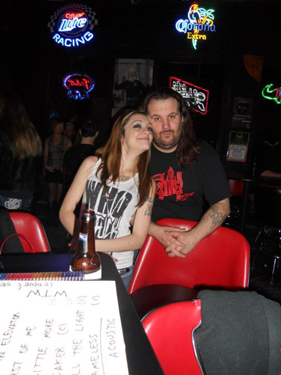
TI: The Galaxy Club off of Commerce. That was my first "official" show.
PAO: Who was on the bill?
TI: Tryin' to think here. Um, I think it was Fallen Breed, Powderburn, Likely Story, Innocence Lost, and maybe somebody else?
PAO: This is 2006?
TI: Yeah. The flyer might be out on Myspace, I don't even know anymore.
PAO: How would you say a new act could best carve out a niche for itself in the crowded local metal scene?
TI: What they need to do is work with a promoter . . . you know, get their name out there a little bit more, get out better flyers, whatever. And then, whenever they have a show, bring out samplers for the crowd, that way the crowd can, even if they missed your set, they have something they can come back to and realize, you know, oh this band's actually pretty good, and just push it. Keep doing what they've gotta do, writing more material, play enough good shows that aren't too close together. A lot of bands have the impression that the more shows they do the better they get, but in reality no matter how new or how old you are, the less shows you do in the same area the better off you end up being.
PAO: A lot of clubs won't even book a band if they're playing in the same city during the month.
TI: Yeah, I try not to. I usually do three week holds - three weeks inside of the date, don't play in the D/FW metroplex. It'll hurt your draw, and make me mad.
PAO: Do you think a band can do better with a promoter or booking agency handling its affairs, or should they start out managing themselves?
TI: It really depends on what the band wants to do. If the band just wants to play, you know, relatively local shows, then have at it yourself, but if you want to branch out and get more under your feet and everything of that nature - play different venues, different cities, different bands - get a booking agency behind you, get a promotions agency behind you. Work with somebody who knows what the fuck they're doing.
PAO: What are some of the mistakes that most bands make in trying to make a name for themselves?
TI: Overbooking. That's the biggest mistake they've made is overbooking. No matter what band, I've seen plenty of bands book a show within the metroplex week after week of each other and it's like, why? One show's gonna be good, the other show's gonna be bad, or both shows will be half decent and mediocre, and your pay will suffer. I mean it's not really about the pay, but there's costs associated with being in a band - you gotta pay practice space fees, equipment fees, gas - so the more that you can do monetarily and less by playing, the better off you are. And not promoting effectively. No actual flyers at the venue is always just a bad sight.
PAO: Just expecting people to show up.
TI: Yeah. I mean I'm not going to say that it's that much of a help, but it definitely can't hurt you at all. 'Cause you never know who's going to pay attention to your flyer. Whether it's a fan or a club owner or a business promoter, anything of that nature. If it's not there people won't know. But if it is then people will at least have the general idea of what's going on.
PAO: I'm a firm believer in the power of networking. How important a role does that play in a band's success?
TI: Moderate importance. If you just go to random shows with bands that you don't even know, pay money to get in the door, hand out your CD's and whatnot and talk to people, you can actually get bigger and better shows that way, just because you went out and supported local music. Or even a national show with local bands - you just happen to find somebody to talk to, they can be like, "Oh yeah we have a show coming up through whoever, get a hold of him, maybe he can help you out or something." You know, they can always put in a good word for somebody. But again, if you don't go out, you don't get to do anything, you can't say "well why aren't we gettin' whatever." Network with everybody that you can.
PAO: You think that's happening less or more now compared to a few years ago?
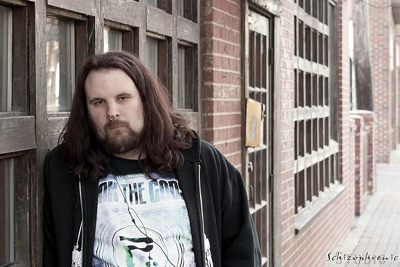
PAO: So on that note, what is your opinion of the current state of the local music scene, and what do you think could be done to improve it, as opposed to where it was, say, ten years ago?
TI: It's getting better. However, it still needs help. A lot of it comes down to bands promoting their shows properly. Whenever I have my own show I make my own flyers for it, and I have no opposition to you using it for your own purposes, and if you want me to make a new one for you I can have it done for cheap, so it's just . . . it really comes down to networking and promoting. Go to shows, go to national shows, hand out flyers for the event and say, "Hey, we're a band, come check us out." There always needs to be something for somebody to see within the industry or on the street to get your band noticed. Playing shows is a big part of it, but the work before the show is even bigger.
PAO: I remember that as late as 2003 in Deep Ellum you could still have to park all the way down by the Undermain Theater because you couldn't find a meter, and you couldn't find a parking space anywhere. Now, when I come to shows, I pretty much always park at a meter. Rarely will I ever park in a lot. You used to see a lot people walking down the streets, you used to see street vendors, a lot of that sort of thing. It's gotten better since Trees reopened, but what do you think is the reason for this? Do you think it's just bad management on the part of the club owners that caused so many clubs to close? Do you think it's an effort on the part of the city to try to gentrify the area?
TI: You know, that's a really good question. There's so many different scenarios that you could take into that. It doesn't help that half the venues downtown have closed up and boarded up and they're still for lease, and it doesn't help that only so many venues only want to work with, you know, industrial type bands at the same time. Some bands only work with certain venues, unfortunately, and I think that's their fault per se, 'cause sometimes you can go and rent a smaller venue out and pack it fully, build your own bill for cheap, and have a fuckin' great show, versus getting into something like Curtain Club, and doing your best, but only having so many people there, making it look small 'cause of the venue size.
Gentrification of the city isn't necessary in Deep Ellum. Let it be what it needs to be. It's an arts district. It's there for music. I have no opposition to the school being there that's going to be there eventually, but there's been a lot of, you know, opposition and other unnecessary things. They're putting it there for a reason, they think it could work there, so let it work out and let them work around the laws that are already in place.
PAO: A few years ago the city introduced the SUP ordinance, which many say was primarily intended to drive certain types of quote-unquote "undesirable businesses" out of Ellum in preparation for a planned gentrification. There was in fact an artist's illustration circulating at one point which depicted a future "classier" and more Uptown-styled setting which would replace the current community of bars, clubs, and restaurants, and all the old warehouse buildings and "alternatively" styled businesses like Moda were going to be supplanted by shopping centers and lofts. Some venues were casualties, like the Monkey Bar and Tomcats, which was one of my favorite places to shoot at. Tomcats closed down in part because of the lofts across the street - even though the laws stipulated that if you lived in that district you had to expect higher noise levels, they were still able to close the venue down. There was a tattoo parlor that tried to open, and they used the SUP to block them getting a license. But it seems now that they've backed off of that a little bit. Trees was able to reopen. They reopened the Gypsy Tea Room, not as the Gypsy Tea Room, but as the Prophet Bar, and they seem to be doing pretty well now. But with the school . . . it seems inevitable that this school is going to happen, because of the zoning.
TI: Oh, it's happening.
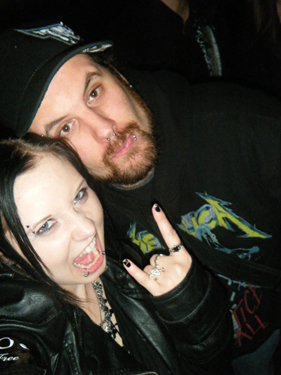
TI: I think it's a bit of both, like there's obviously the push for higher education 'cause higher education's very important, but at the same time the complaint that I've been seeing is like, "Well, I own a bar across the street from it, and the law states this." It's like, okay, right, but you were there first, therefore they figured out a way to grandfather each other into that so therefore, you can't open a new bar . . . well you can until it opens, so as long as it's not open, you can open up a new bar, but if you're already there, you've already established yourself, it's grandfathered into the law, so they can't do shit about it. Just don't close. There's legal loopholes everywhere, that's always how it's been.
PAO: Do you think the district's going to be able to survive this?
TI: Yeah, I don't see why not. If the district keeps on doing what they're doing and knows what they're doing and can do it legally, and right, it won't hurt anything. The kids won't be there in the middle of the night, Friday night anyway, so I don't really think it'll affect a whole lot in the long run. Bar sales might dwindle a bit during the day, but by 7, 8 o'clock at night the kids are already gone home and then some, so why is it a bother? And yeah, with the lofts being there, it's like, okay, you live in Deep Ellum. It's an arts district. There's music everywhere. Why are you complaining? You had been fully advised when you moved in here.
PAO: What would you say are the best venues to go to for Dallas local music? The Skillman Street Pub and Tomcats were personal favorites of mine. The Skillman Street Pub [now Tomcats West] moved to Fort Worth and the Ridglea no longer plays host to our kind of music, they won't book it.
TI: They might. They're reorganizing as we speak. They have the Ridglea Bar, which is currently BYOB, right next door to it and everything. And . . . I don't know the owners, I don't know what they're trying to do, but they're gonna figure out soon that pigeonholing yourself with a certain music will only get you so far. As far as Dallas goes, I'd say Curtain and Reno's a lot, because they actually have good, random mixes in there, and then when Trees actually has a local show, they do it good. They've been doing a lot of nationals as of late, which is fine, 'cause there's always at least one local band on the show . . . But uh, I don't know. It really I guess depends on the venue and what you're looking for. Like I know Dada doesn't do a whole lot of mainstream, they do a lot more indie and hipster, but the Door does a lot of everything, so I guess it really just depends on what you want out of a venue.
PAO: What do you see as the future of the music scene in Dallas?
TI: It's never gonna go away. There's always gonna be a music scene in Dallas, whether it's Deep Ellum or Bishop Arts or Uptown or Lower Greenville. There's always going to be a way to bring out new music and new venues. It may eventually shift elsewhere, it may not. As long as the bands keep striving for excellence and keep promoting themselves and keep packing the venues, or at least trying to pack the venues . . . that's all you can do is try.
PAO: So you don't see what's happened in Deep Ellum over the last several years as a sign that the music scene in Dallas is going downhill?
TI: No. People are getting older. People will eventually have kids, and their kids can come out, so . . . it's a vicious cycle, but it happens every time.
PAO: We're just at a low point right now?
TI: Eh, give it a couple years, probably two years tops, it'll be back up to where it needs to be. Yeah I'm not going to go anywhere, so, you know, as long as I'm still in business, there will be something going on.
PAO: Who handles your photography?
TI: A multitude of photographers. I have Fearless Portraits for Dallas, which is my friend Aaron Stone, and then Casey Stuhlman with Dark Horse Images for Fort Worth. I figure it's easier for me to have somebody within each city that I work with, just so that transportation costs are lower that way. It's preferred, like if I have a Dallas photographer, let him work Dallas, and our friend in Fort Worth can work Fort Worth for me. If you live that much closer to the venue, why bring out somebody who's farther away?
PAO: Have you done any booking in Denton?
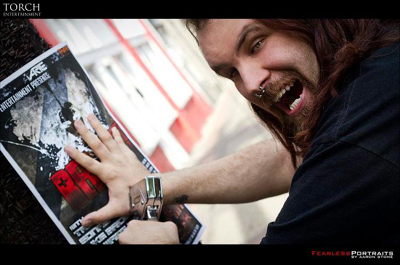
PAO: That plus I don't know that the venues are suited for certain types of music. The Razorblade Dolls played Andy's Bar once, which I felt was an ill-advised decision.
TI: Yeah, the Razorblade Dolls would better be suited for probably Hailey's, with the stage. But um, I just don't know that Denton is ready for industrial music at this point.
PAO: I would agree with that.
TI: There's a lot of good bands out in Denton. There's a lot of good bands that come through Denton. It just really depends on the night.
PAO: I have one of the sampler CD's, I believe from 2007. How many of these compilations have you released so far?
TI: The new one that just came out is compilation #4 for rock bands. I do one for rock, one for metal. I try to do two a year on average now. I have two metal CD's, and four rock CD's. Metal is harder to work with as far as getting bands on board. It takes time.
PAO: Who are some of the artists who have appeared on them so far?
TI: There's been a multitude. Um, Echelon High, transRelic, Redefine, Moving Atlas, I had With These Words on one of them at one point, I have Deaf Angel on the new one, Pulse is on the new one, Messer, Dawn Over Zero, Kennedy, The Sammus Theory from Phoenix, Arizona is on the new one . . . there's a multitude of bands honestly. It really just depends. Like the new one has twenty-five bands from all over. I think like twenty are from actually like Dallas-Fort Worth, and then there's a few scattered.
PAO: How would a band go about getting a slot on an upcoming CD?
TI: Contact me on Facebook for information. That's facebook.com/TorchEntertainmentDallas. Just send me a message on there. I'll reply to it within a couple days, if that, and we can discuss further details from there.
PAO: And that would be the means of contacting you if they were looking to be booked on a show.
TI: Yeah, preferably. I have e-mail and everything, but Facebook is that much easier for me to handle.
PAO: Do you have any associations with local media, like Lit magazine?
TI: None whatsoever. I use Lit magazine for Reno's shows, 'cause Reno's pays for the advertisement, so I just let Lit Monthly know what my shows are and get it for free. But as far as anything else of that nature goes, it costs too much money for me to consider putting a legit ad in there for a random show.
PAO: How important would you say online media such as Facebook or Myspace or even a site like Pegasus are in helping a band succeed?
TI: Not very. I'd say it's maybe a quarter of the promotional efforts that you need to put into it. Your effort should really lie on the street level because not everybody's gonna be online, not everybody's gonna be on Pegasus News at random, not everybody's gonna see your random post on Facebook. But if you're out on the street handing people out free samplers or free flyers or something that says, you know, "Hi I'm in a band," you're that much more likely to get recognition from it. Online resources are great, but they're just resources. They shouldn't be used for primary promotion.
PAO: Does that go for online radio shows, too?
TI: I'd say so. I mean, utilize everything that you can, and with online radio shows . . . I'm on one, I utilize it to the fullest extent possible, but I can't guarantee that everybody I know will listen in to the show. You can play it back, you can download the episode every day, something that aired five weeks ago you might just get a hold of now. So if I promoted a show for five weeks ago - oh, well oops, now you lost out 'cause you didn't listen to it on time, you know. It's just a matter of reaching the audience within the key time frame. All you can do is try. You might get one or two people off of that show, that come out to your show. It can't hurt.
PAO: Is there anything else you'd like to say?
TI: No, not really. I think that about covers it. Listen to my Torchcast every week on WhiskeyBoy Radio. That's at whiskeyboy.us. You can find my links on there. New episodes come in weekly, full of debaucherous, random interviews and crap, plus good local music.
PAO: Thank you for agreeing to the interview.
TI: Of course, my pleasure.
IHOP, 6/24/2012